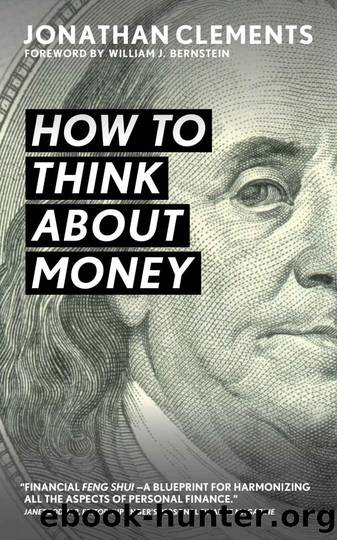How to Think About Money by Jonathan Clements

Author:Jonathan Clements [Clements, Jonathan]
Language: eng
Format: epub, azw3
Publisher: Jonathan Clements LLC
Published: 2016-08-31T22:00:00+00:00
Saving Like Crazy
Like the research on money and happiness, the insights from behavioral finance are compellingâbecause they ring true. When we stop and think about it, we see how shaky the connection is between money and happiness. Similarly, as rational as we like to think we are, we also know the stock marketâs turmoil plays with our heads and we know we often spend far more than we planned.
How can we keep ourselves on the straight and narrow? While experts have uncovered an astonishing array of mental mistakes, three strike me as especially problematic. First, we lack self-control, which means we tend to overspend and take on too much debt. Second, we have too much confidence in our investment abilities, leading us to trade too much, buy actively managed funds and make large investment bets, as we try to notch market-beating gains. But that confidence is easily shaken, which brings us to the third problem: We are too quick to change our minds when markets tumble, in part because we are so averse to losing money.
How can we overcome these traits and rewire our brains, so we succeed financially? I believe we need to squelch our instincts and strive to acquire three financial habits, none of which comes easily: We need to turn ourselves into great savers, we need humility and we need to train ourselves to focus on the stock marketâs fundamental value. The rest of this chapter is devoted to these three crucial attributes.
The first is the most important. Even if we have the tenacity to stick with a sensible investment strategy in the face of market turmoil, our investment gains wonât amount to much in dollar terms unless we have a decent sum invested in the marketâand that takes good savings habits.
Those habits donât come naturally. When my kids were young, we would often take walks around the neighborhood. They would see big homes with manicured lawns, and his and her luxury European sedans sitting in the driveway, and they would exclaim, âWow, they must be rich.â As Hannah and Henry rolled their eyes, I would climb onto the parental soapbox: âThat doesnât mean they have a lot of money. It means they spent a lot of money.â I would then point out that the mansion might be heavily mortgaged, the cars might be leased and the landscaper might still be awaiting payment.
We associate wealth with outward displays of opulence. But this is yet another instance when our instincts fail us. Over the decades, both at The Wall Street Journal and at Citigroup, I have met and corresponded with thousands of ordinary Americans who have amassed seven-figure portfolios. Many of these folks had relatively modest salaries. Most were mediocre investors. But almost all shared one key attribute: They were extremely frugal, otherwise known as cheap. Our wealthiest neighbors are often the family with the modest house and the second-hand cars. They have heaps of money because they arenât big spenders, and instead live far beneath their means and save diligently.
Download
How to Think About Money by Jonathan Clements.azw3
This site does not store any files on its server. We only index and link to content provided by other sites. Please contact the content providers to delete copyright contents if any and email us, we'll remove relevant links or contents immediately.
Rich Dad Poor Dad by Robert T. Kiyosaki(6633)
Pioneering Portfolio Management by David F. Swensen(6301)
How To Win Friends and Influence People by Dale Carnegie(4513)
The Money Culture by Michael Lewis(4207)
The Dhandho Investor by Mohnish Pabrai(3765)
The Wisdom of Finance by Mihir Desai(3748)
Liar's Poker by Michael Lewis(3449)
Fooled by Randomness: The Hidden Role of Chance in Life and in the Markets by Nassim Nicholas Taleb(3124)
The ONE Thing by Gary Keller(3071)
Mastering Bitcoin: Programming the Open Blockchain by Andreas M. Antonopoulos(3045)
The Intelligent Investor by Benjamin Graham Jason Zweig(3041)
The Psychology of Money by Morgan Housel(3036)
Rich Dad Poor Dad: What The Rich Teach Their Kids About Money - That The Poor And Middle Class Do Not! by Robert T. Kiyosaki(2958)
Investing For Dummies by Eric Tyson(2954)
How to Day Trade for a Living: Tools, Tactics, Money Management, Discipline and Trading Psychology by Andrew Aziz(2949)
How to Win Friends and Influence People by Dale Carnegie(2915)
Market Wizards by Jack D. Schwager(2701)
How to Pay Zero Taxes, 2018 by Jeff A. Schnepper(2655)
Zero Hour by Harry S. Dent Jr. & Andrew Pancholi(2649)
